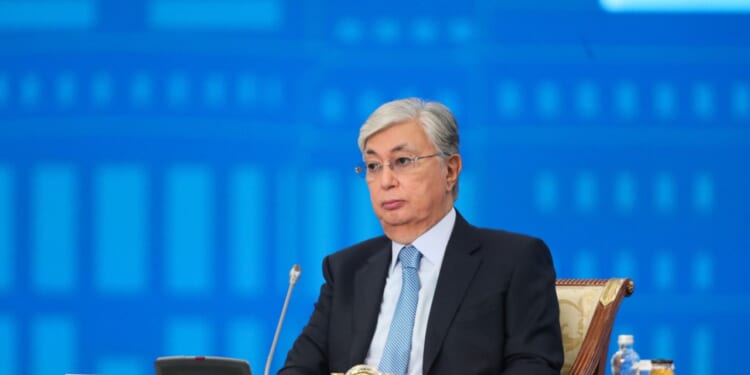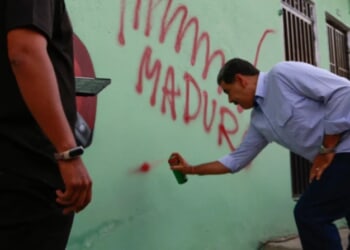If Iran and Israel return to war, Central Asia will face not just economic fallout, but the risk of entanglement in a broader conflict.
The ceasefire between Israel and Iran, brokered by US president Donald Trump in June, may not hold. A collapse of the truce would reverberate far beyond the Middle East. For Central Asia, a renewed war could disrupt vital trade corridors, jeopardize economic interconnectivity, and shake a fragile geopolitical equilibrium.
The Central Asian states have stakes in any war involving Iran. In June, these former Soviet republics responded to the Iran-Israel war, which included US strikes on Iranian nuclear facilities, with calls for de-escalation, while working to prevent the conflict from destabilizing their own region.
For Turkmenistan, the only Central Asian republic bordering Iran, the risk of spillover was especially acute. Yet the stakes were also high for Kazakhstan, Kyrgyzstan, Tajikistan, and Uzbekistan, which were also vulnerable to the wider fallout. As the Middle East plunged deeper into crisis, all five Central Asian nations carefully navigated their relationships with Iran, Israel, as well as China, Russia, and the West.
Kazakhstan, Turkmenistan, and Uzbekistan understand that relying on their gas and oil sectors will not prove economically sustainable, which makes trade routes particularly important to their long-term economic health. Central Asian states are seeking to become increasingly integral to key trade corridors, making these countries pivotal actors in East-West and North-South interconnectivity. Mindful that all of them are landlocked or doubly landlocked, it is difficult to overstate the value they place on maintaining relations with Iran, which provides them access to the Persian Gulf and, by extension, global markets.
The Bandar Abbas port, in particular, is a key facility in this respect. Although Western and UN sanctions on Iran are a hindrance to deeper economic interconnectivity with the country, Central Asian states can’t help but view Iran as providing them with vital corridors, which will be necessary for their economies to thrive long-term.
Iran’s influence in Central Asia rests on centuries of shared history, language, and culture. Tehran emphasizes this civilizational legacy to try to position the region within its sphere of influence. Nowhere is that clearer than in Tajikistan, Central Asia’s only Persian-speaking country, where linguistic and cultural ties underpin Iran’s soft power reach.
“Until the Russification in the 19th and Sovietization in the twentieth centuries, the Persian language and literary traditions were widespread in the region. This legacy still acts as a source of attraction towards Iran, especially in Tajikistan and Uzbekistan, which have a large Tajik population and its language is extensively influenced by Persian,” said Dr. Shireen Hunter, an honorary fellow at the Center for Muslim-Christian Understanding at Georgetown University who served as an Iranian diplomat before 1979.
However, the Islamist ideology of Iran’s government has fueled problems between Tehran and the Central Asian republics, highlighting the Islamic Republic’s failure to effectively leverage cultural, historical, and linguistic commonalities. This dynamic gave rise to significant tensions between Iran and the staunchly secular Central Asian governments throughout the 1990s and 2000s, particularly as these newly independent states grappled with the threat of jihadist terrorism.
Uzbekistan, for instance, suffered between the late 1990s and early 2000s from bombings and incursions carried out by violent jihadist factions. In Tajikistan, past Iranian support for the Islamic Renaissance Party strained bilateral relations. By the mid-2010s, Dushanbe had closed down Iranian cultural organizations operating within Tajikistan’s borders.
Although Dushanbe-Tehran relations began warming by the end of the last decade, that diplomatic row highlighted how Iranian influence, once rooted in shared linguistic and cultural heritage, has been viewed through a lens of ideological mistrust and geopolitical unease across parts of Central Asia. Furthermore, the Turko-Persian divide has been another barrier to deeper ties between Iran and Central Asia’s four Turkic countries.
“A shared Islamic heritage and centuries of Persian cultural influence on Central Asia provide a favorable backdrop for relations between Kazakhstan and Iran. These factors facilitate mutual understanding on a human level and make diplomatic engagement smoother. Kazakhstan holds deep respect for Iran’s rich history and culture. However, religion and culture are not decisive factors in the foreign policy of secular Kazakhstan,” Dr. Sanat Kushkumbayev, a Senior Fellow at the Kazakhstan Institute for Strategic Studies, explained to this author.
“Astana’s relationship with Tehran is not built on religious solidarity (Kazakhstan’s Sunni Islam differs markedly from Iran’s Shiism), but on sober economic and geopolitical calculation. Cultural affinity serves as a useful tool of soft power and diplomacy, yet the priorities remain security and mutual economic benefit,” he added.
Central Asian states continue to send Tehran the same message they voiced in the 1990s: They want nothing to do with the Islamic Republic’s political model. In other words, from a political standpoint, they view Iran as anything but a partner of choice. However, Central Asian states still desire to work with Iran as a potential transit country for shipping goods between East and West. In this respect, these former Soviet republics are likely closer to Tehran today than at any previous point, according to Bruce Pannier, a Turan Research Center fellow and board member of the Caspian Policy Center.
Ultimately, while Central Asian republics value Iran as a trade corridor and seek to have problem-free relationships with Tehran, these ex-Soviet states do not want the conflicts between the Islamic Republic and the American-Israeli alliance to play out on their soil.
Central Asian states “don’t want to have anything to do with Iran’s political take on the world, or side with them in any of the disputes that Iran has with other countries in the world,” Pannier told this author.
“They don’t want to cancel anybody out. They don’t want to cancel Iran out either. But they’re certainly not going to get closer to Iran knowing that it might in some way inhibit their relationship with other partners, including Western partners who actually have much more money to offer Central Asia than Iran ever will have, so that’s part of the figuring in [Central Asian states’] relations with Iran,” he added.
At the same time, these countries are close to Russia, whose relationship with Iran underpins a role for Tehran in Central Asia. Nonetheless, with Moscow distracted by the Ukraine conflict and challenged by EU and NATO countries in Central Asia, Russia’s influence in this former Soviet space is not as strong as it was years ago. Furthermore, while Iran is not a major player in Central Asia’s security architecture, one exception, noted Pannier, relates to the struggle against Islamic State Khorasan Province in Afghanistan—a group that has its eyes set on Central Asia.
Israel’s Quiet Role in Central Asia’s Strategic Calculus
All five Central Asian states maintain diplomatic ties with Israel. In the cases of Kazakhstan and Uzbekistan, their relations are through respective embassies and the exchange of ambassadors, while Kyrgyzstan and Tajikistan, and Turkmenistan’s ties with Israel are via interest sections in neighboring countries’ embassies. A longstanding Iranian concern is that Israel could, at some future point, use these relationships to counter Iran from the East. Tehran is particularly concerned about Israel’s possible espionage activities in Turkmenistan, which shares a 713-mile border with Iran.
Unlike Azerbaijan, Central Asian states have not allowed their territory to serve Israeli aims against Iran. The Central Asian republics seek to balance their relationships with Iran and Israel in a manner that is interest-based and shaped by hard-nosed realism.
Throughout the Israeli war on Gaza, Central Asian countries have aligned with most Muslim-majority and Global South countries in the United Nations when it comes to condemning Israeli actions toward Palestinians. For example, Uzbekistan backed a UN General Assembly resolution that demanded an Israeli retreat from Palestinian territories occupied since 1967; two months later, Kazakhstan and Kyrgyzstan signed onto Turkey’s call for a global arms embargo on Israel. Yet, none of these mostly symbolic moves have been accompanied by more concrete action against Israel on the part of Central Asian republics, such as expelling ambassadors, downgrading or severing diplomatic relations, or imposing economic sanctions.
Describing Kyrgyzstan’s relationship with Israel as “formal but limited,” Aigerim Turgunbaeva, a Bishkek-based journalist, told this author the Central Asian country strikes a “diplomatic balance, engaging both Israel and Iran while refraining from taking sides.” As she put it, Bishkek’s approach toward Iran and Israel is “guided by pragmatism and the desire to preserve constructive relations with all partners.”
Kazakhstan’s relationship with Israel revolves around technology, agriculture, and medicine. As Dr. Kushkumbayev mentioned in an interview with this author, “Israeli innovations are helping Kazakhstan modernize its economy.” However, Astana refuses to have its ties with Jerusalem come at the expense of its relationship with Iran, which is crucial to Kazakhstan’s economy in terms of transport and logistics—chiefly the International North-South Transport Corridor—grain and metal trade, as well as cooperation with fellow Caspian states.
“Kazakhstan does not seek to please anyone. Astana’s approach is to pursue pragmatic engagement based on the principle of ‘both–and’ rather than ‘either–or.’ The essence of this strategy lies in developing mutually beneficial partnerships across different domains with both Iran and Israel,” explained Dr. Kushkumbayev.
“Astana thus clearly delineates its interests: geography and transit with Iran, modernization and innovation with Israel. This pragmatic approach enables Kazakhstan to maintain productive relations with both states while avoiding an unfavorable choice between them,” he added.
Public Sentiment about Iran and Israel
Public attitudes toward Iran and Israel across Central Asia are far from monolithic. They vary according to each country’s distinct cultural fabric and historical experiences. For instance, Tajikistan feels a deeper sense of kinship with Iran, rooted in shared Persianate language, literary heritage, and cultural traditions. This historical and linguistic proximity has made segments of the Tajik population more sympathetic toward Tehran in its conflicts with Jerusalem, despite periodic political tensions in Iranian-Tajik bilateral affairs.
In contrast, in other Central Asian republics where such affinities are absent, Iran tends to occupy a more peripheral space in public consciousness, and popular opinion is often shaped less by ideological or religious alignment than by practical concerns and domestic priorities.
In Kyrgyzstan, like virtually all Muslim-majority and Global South countries, there is widespread support for the Palestinian cause among ordinary citizens. But there is a noticeable detachment from the broader complexities of the Iran-Israel conflict among the Kyrgyz population. For most citizens, Iran and Israel’s hostilities remain distant from the immediacy of daily life.
In Kazakhstan, public opinion broadly favors Astana’s balanced, diplomatically active, and non-interventionist foreign policy approach. Most citizens of Kazakhstan view regional stability as essential to the country’s continued development and internal cohesion. Astana’s cautious pragmatism favors a political and diplomatic resolution to the Iran-Israel conflict. Rather than aligning with either side, Astana seeks to project itself as a neutral actor focused on maintaining peace and avoiding entanglement in external conflicts. This position resonates with the country’s general population.
Taken together, these public perspectives underscore the nature of Central Asian attitudes toward the dynamics shaping Iran-Israel hostilities. While historical, cultural, and religious factors shape the emotional undercurrents of public opinion, practical considerations—ranging from domestic stability to national development goals—ultimately define the political space within which Central Asian states and societies navigate such consequential geopolitical crises.
Central Asia: Caught Between Conflict and Connectivity
All of these dynamics converge into one pressing risk for the region. Should hostilities resume, the implications for Central Asia could be profound. A renewed confrontation between Tehran and Jerusalem risks quickly triggering a wider regional conflagration, generating serious concern among policymakers in all Central Asian states. Officials in these five former Soviet republics are acutely aware that a breakdown in the fragile calm would carry high geopolitical and economic costs, most immediately in the form of disrupted trade routes, strained diplomatic alignments, and heightened insecurity along key logistical corridors that underpin their national economies.
The risk goes beyond economics. The November 2024 killing of Rabbi Zvi Kogan—allegedly carried out by Uzbek nationals in the United Arab Emirates—has spotlighted Iran’s suspected ability to mobilize “proxies” in Central Asia. In a renewed Iran–Israel confrontation, those fears would resurface: Central Asia could become a staging ground for militant operations, drawing the region into a broader Middle Eastern spiral.
If Iran and Israel return to war, Central Asia’s five republics will face not just economic fallout, but a heightened risk of becoming entangled in a broader conflict. These countries have worked hard to cultivate neutrality, diversify partnerships, and promote interconnectivity. Preserving that progress demands a careful balancing act, which defends national interests while insulating the region from external shocks. In a volatile geopolitical landscape, their future stability may depend on their ability to remain equidistant from great power rivalries and regional showdowns alike.
About the Author: Giorgio Cafiero
Giorgio Cafiero is the CEO of Gulf State Analytics, an Adjunct Assistant Professor at Georgetown University, and an Adjunct Fellow at the American Security Project. He is a frequent contributor to Al Jazeera, Gulf International Forum, The New Arab, Responsible Statecraft, Stimson Center, and Amwaj Media. Throughout Mr. Cafiero’s career, he has consulted many public and private sector entities, briefed diplomats of various countries on Gulf Affairs, and worked as a subject matter expert for multinational law firms. Mr Cafiero holds an M.A. in International Relations from the University of San Diego. Find him on X: @GiorgioCafiero.
Image: Pavel Mikheyev / Shutterstock.com.


















